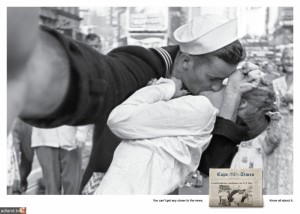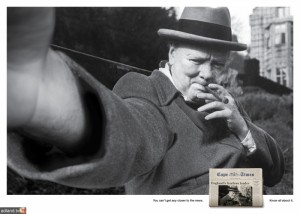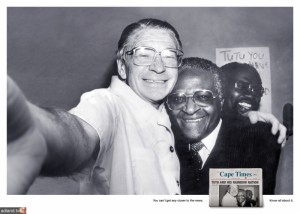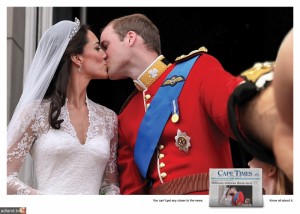e-mail: me@aleallocca.com

3… 2…1… Smile and take your selfie pic!
Posted In Blog
LONDON – If there had been a mobile phone during several historical moments, what would the photos have been? Since it’s impossible to travel in time, that’s a question that has been answered by famous advertising agency “Lowe Cape Town” based in South Africa. And the results are the “selfie” pictures you can watch in this post.
 Yes, we know they are graphic elaborations, but these pics are a starting point for writing about a genre: self-portraits. Nothing new, think about famous painters like Vincent van Gogh or Frida. But the question would change if we spoke of William and Kate during their unforgettable day, or about Winston Churchill when the mobile phone hadn’t been invented. The same question applies to other historical moments, like Desmond Tutu’s hug and the “Sailor kiss”. During those moments, nobody had a mobile phone for taking pictures of themselves. But now, the question is not really because there are almost 7 billion phones operating in the world.
Yes, we know they are graphic elaborations, but these pics are a starting point for writing about a genre: self-portraits. Nothing new, think about famous painters like Vincent van Gogh or Frida. But the question would change if we spoke of William and Kate during their unforgettable day, or about Winston Churchill when the mobile phone hadn’t been invented. The same question applies to other historical moments, like Desmond Tutu’s hug and the “Sailor kiss”. During those moments, nobody had a mobile phone for taking pictures of themselves. But now, the question is not really because there are almost 7 billion phones operating in the world.
 It’s illustrated very well by social media like Twitter, Facebook, Pinterest, Instagram, Flickr and others, because every day, all the time, people are uploading self-portraits. Normal people like celebrities, girls and boys, mommies and daddies, in the bath or in the kitchen, on the beach, at the cinema or in bed with their lovers. What is there behind the “selfie”?
It’s illustrated very well by social media like Twitter, Facebook, Pinterest, Instagram, Flickr and others, because every day, all the time, people are uploading self-portraits. Normal people like celebrities, girls and boys, mommies and daddies, in the bath or in the kitchen, on the beach, at the cinema or in bed with their lovers. What is there behind the “selfie”?
 Dr Aaron Balick, a psychotherapist who has written a book about the human motivations behind social networking, explains that we have both “active online identities” and “passive online identities”. “A passive one is like when you search for yourself, or when friends post information about you – it’s your online identity that you have no control over,” he explains. “Active online identities are ones you can control, like a Facebook profile. A selfie is an expression of an active online identity, something you have some control over. You might take lots, but you’ll publish the ones you like – even if they are silly or unflattering.”
Dr Aaron Balick, a psychotherapist who has written a book about the human motivations behind social networking, explains that we have both “active online identities” and “passive online identities”. “A passive one is like when you search for yourself, or when friends post information about you – it’s your online identity that you have no control over,” he explains. “Active online identities are ones you can control, like a Facebook profile. A selfie is an expression of an active online identity, something you have some control over. You might take lots, but you’ll publish the ones you like – even if they are silly or unflattering.”
“Just like with other forms of behaviour that push the edges of the social envelope, those who create provocative selfies to get attention will not only not get the kind of attention they really want, but may find that they have created something that they have a hard time getting rid of,” concludes Rutledge.
 A search on photo sharing app Instagram retrieves over 23 million photos uploaded with the hashtag #selfie, and a whopping 51 million with the hashtag #me, and teenagers in America are sharing more information than ever about themselves on social media: 91% post photos of themselves online – up from 79% in 2006. So, it’s not just an idea, but a true reality. (A.A.)
A search on photo sharing app Instagram retrieves over 23 million photos uploaded with the hashtag #selfie, and a whopping 51 million with the hashtag #me, and teenagers in America are sharing more information than ever about themselves on social media: 91% post photos of themselves online – up from 79% in 2006. So, it’s not just an idea, but a true reality. (A.A.)




